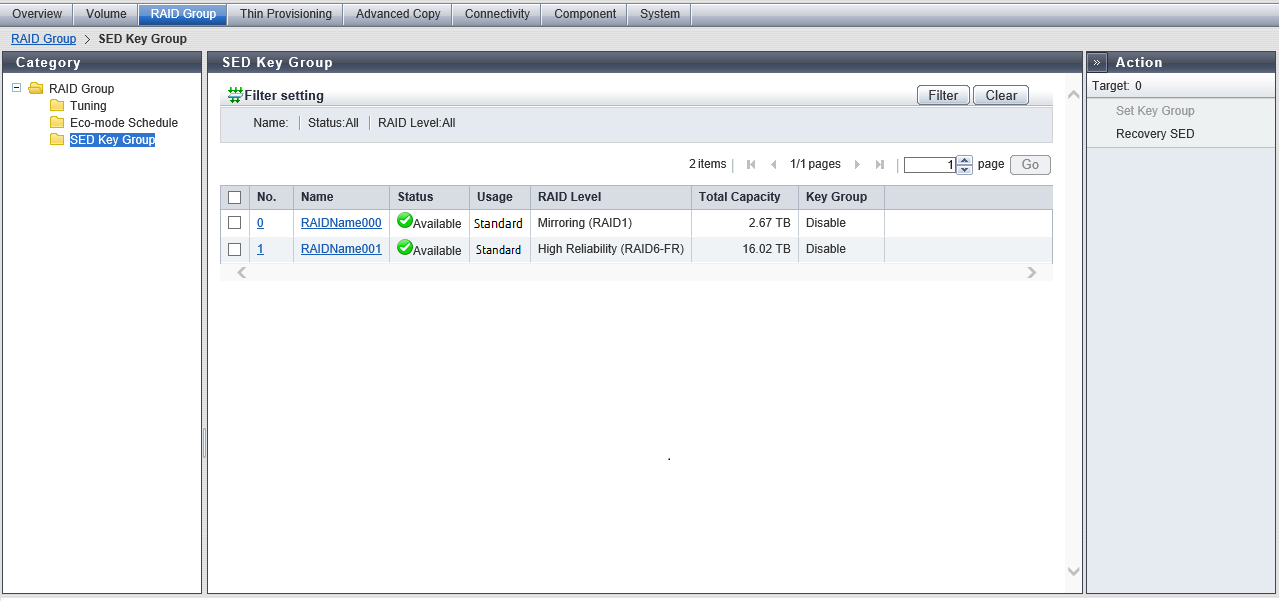SED Key Group
Overview
This function displays the key group settings for the RAID groups that are configured with SEDs.
One key group can be created in the storage system.
Use the [Key Group] screen to check the SED authentication key information and the SSL/KMIP certificate information that is used for the key group. Refer to the [Key Group] function for details.
There are two types of SED keys: an SED authentication key that is managed by the key server and a common key that is stored in the storage system. If a RAID group that is configured with SEDs is registered in the key group, the relevant RAID group is managed by the SED authentication key. If the RAID group is not registered in the key group, the relevant RAID group is managed by the common key.
RAID groups that are configured with SEDs can be added in the key group or deleted from the key group. Refer to the [Set Key Group (RAID Group)] function for details.
User Privileges
Availability of Executions in the Default Role
| Default role | Availability of executions |
|---|---|
| Monitor | |
| Admin | |
| StorageAdmin | |
| AccountAdmin | |
| SecurityAdmin | |
| Maintainer |
Refer to "User Roles and Policies" for details on the policies and roles.
Display Contents
In this screen, the basic information of a RAID group that is configured with SEDs and the registration status to the key group are displayed.

RAID Group List
| Item | Description |
|---|---|
|
No. |
The RAID group number is displayed. Click this item to display the [RAID Group Detail] Screen ([Basic] Tab). |
|
Name |
The RAID group name is displayed. Click this item to display the [RAID Group Detail] Screen ([Basic] Tab). |
|
Status |
The RAID group status is displayed. Refer to "RAID Group Status" for details. |
|
Usage |
The usage of the RAID group is displayed.
|
|
RAID Level |
The RAID level is displayed. High Performance (RAID1+0) High Capacity (RAID5) High Reliability (RAID6) High Reliability (RAID6-FR) Reliability (RAID5+0) Mirroring (RAID1) Striping (RAID0) |
|
Total Capacity |
The total capacity of the RAID groups is displayed. |
|
Key Group |
The set state of the key group for the RAID groups is displayed.
|
Filter Setting
Function Description
Filter setting is a function used to display a list of only the RAID groups meeting all the specified conditions.
No filtering is set by default. The following table shows conditions that can be specified.
| Item | Description | Setting values |
|---|---|---|
Name |
Input the RAID group name that is to be displayed. RAID groups matching or partially matching the entered name are displayed. When not using the RAID group name for filtering, leave this item blank. |
RAID group name Blank |
Status |
Select the status of the RAID group that is to be displayed. When not using the RAID group status for filtering, select "All". |
All Refer to "RAID Group Status". |
RAID Level |
Select the RAID level of the RAID group that is to be displayed. When not using the RAID level for filtering, select "All". |
All High Performance (RAID1+0) High Capacity (RAID5) High Reliability (RAID6) High Reliability (RAID6-FR) Reliability (RAID5+0) Mirroring (RAID1) Striping (RAID0) |



